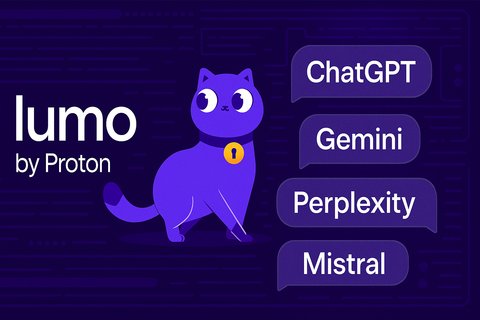Proton, known for ProtonMail and ProtonVPN, has launched a new AI chatbot called Lumo. The promise: end-to-end encryption and no use of your data for training.
But how good is Lumo really? I tested it against the established competition.
Test Setup
I conducted identical tests on all platforms, all with paid subscriptions:
- ChatGPT: GPT-5 model
- Gemini: 2.5 Pro model
- Perplexity: Auto-selection mode
- Mistral: Standard model
- Lumo: Standard model with automatic selection
Evaluation Criteria:
- Response quality
- Depth and style
- Practical utility
Test 1: Linux Questions
Question: "What is the difference between apt and dnf?"
Result:
- All chatbots knew the answer
- Lumo showed outdated references (e.g.,
apt-getinstead ofapt) - Gemini and Mistral provided clear comparison tables
Conclusion: Lumo works, but the knowledge base seems not entirely up-to-date.
Question: "How do I install Podman?"
Result:
- All chatbots provided correct commands
- ChatGPT offered automation suggestions
- Lumo gave solid but unspectacular answers
Test 2: Troubleshooting
Question: "My USB stick is not being recognized. What should I do?"
Result:
- All chatbots recommended logical diagnostic steps
- Gemini offered structured formatting
- Lumo was neat, but without extras
Test 3: Cultural and Historical Knowledge
Question: "What was the GNOME 3 controversy?"
Result:
- All chatbots understood the context
- All mentioned the desktop forks (MATE, Cinnamon)
- Lumo was on par with the competition here
Test 4: Regional Specifics (Switzerland)
Question: "What is TWINT?"
Result:
- All recognized the Swiss payment system
- ChatGPT mentioned outdated Bluetooth beacons (discontinued in 2021)
- Lumo lacked information about prepaid functions
Conclusion: Regional context is understood, but the level of detail varies.
Test 5: Creative Writing
Task: "Write a funny social media post about the summer heat in Basel"
Result:
- All showed local knowledge (swimming in the Rhine)
- Humor was generally weak
- Gemini offered several format options and image suggestions
Conclusion: Creativity is still a work in progress for all of them.
Test 6: Child-Friendly Explanations
Question: "Explain cloud computing to a 6-year-old child"
Result:
- All used good analogies (toy boxes, treasure chests)
- Age-appropriateness was good for all
- Lumo was inconspicuously good here
Summary: Strengths and Weaknesses
Strengths (all platforms)
✅ Linux expertise consistently reliable
✅ Practical problem-solving solid
✅ Historical context correct
Lumo-Specific Observations
⚠️ Outdated knowledge base in some answers
⚠️ Missing feature information (e.g., TWINT prepaid)
⚠️ Neat, but unspectacular
Competitor Advantages
- Gemini: Structured formatting, multiple options
- ChatGPT: Practical automation, detailed customizations
- Perplexity: Precise, direct answers with sources
- Mistral: Clear feature comparisons, good user engagement
Conclusion
Proton Lumo is a solid but unspectacular AI alternative with a focus on data protection.
Who is Lumo for?
✅ You should use Lumo if:
- Data protection is more important to you than perfection
- You want end-to-end encryption
- You are already in the Proton ecosystem
❌ You should use the competition if:
- You want the best answers
- Up-to-date information is important to you
- You need advanced features (image generation, code debugging)
My personal conclusion:
Lumo is good for everyday questions, but not yet on the level of ChatGPT or Gemini. The data protection is a real advantage – but you pay for it with less sophistication.
If you want privacy, take Lumo. If you want performance, stick with ChatGPT.
